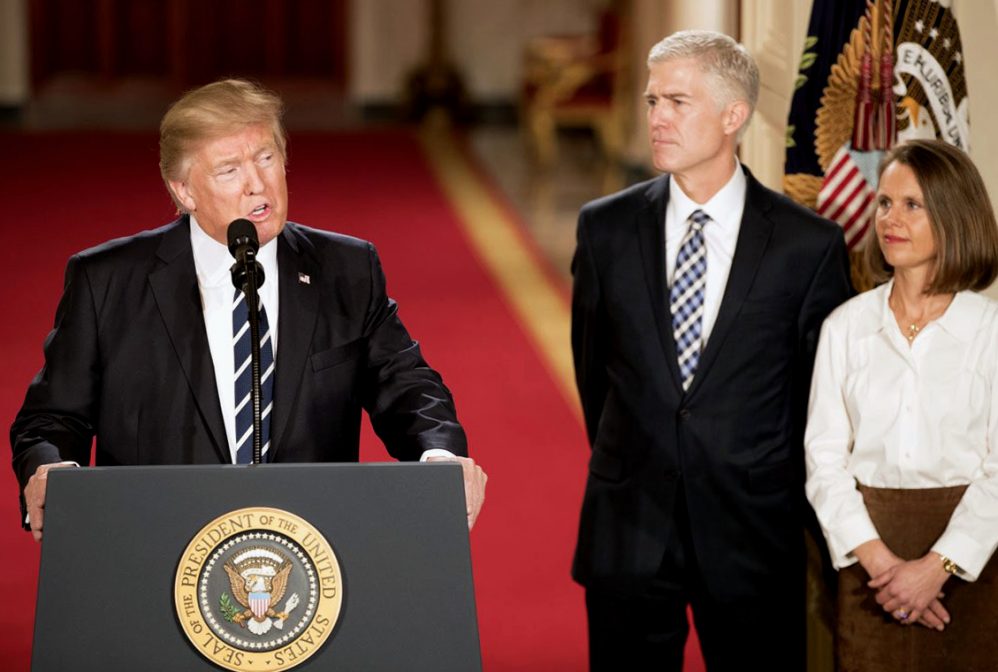Progressives are not known to highly value tradition, nor do they much care what prior generations thought. It is thus a curious spectacle when every few years, after a Republican president nominates someone to the Supreme Court, these same progressives enter some Burkean trance, sanctimoniously wax on about the importance of precedent and judicial stability, and force the nominee to genuflect to the doctrine of stare decisis as if it were a fundamental law of nature.
So it goes with the Supreme Court nomination of Judge Neil Gorsuch. Specifically commenting on Roe v. Wade at his nomination hearing, Gorsuch explained, “[the opinion] is a precedent of the United States Supreme Court. It was reaffirmed in Casey in 1992, and in several other cases. So a good judge will consider it as a precedent of the United States Supreme Court, worthy as treatment of precedent, like any other case.”
The testimony mirrors what Gorsuch has been telling senators privately, notably agreeing with Sen. Susan Collins’s statement that five current justices’ disagreeing with a Supreme Court decision is not sufficient grounds to overturn it.
So should conservatives, particularly pro-lifers who voted for the president for the sole reason that he promised to nominate a judge who would overturn Roe, give in to their inner fear that, in the end, good things will never happen in Washington?
Stare Decisis Is a Consideration, Not a Surety
Maybe, but not because of Judge Gorsuch’s answers. Stare decisis is not, much to the chagrin of senators Feinstein, Franken, et al., a blanket prohibition on the Supreme Court’s changing course. If it were, African Americans would ride in separate but equal train cars (Plessy), former slaves would not have civil rights (Dred Scott), states could not regulate wages (Lochner), and the state could consign whole categories of citizens to special camps based only on their national origin (Korematsu).
So what is stare decisis? Courts have observed that to make law predictable, foster reliance on judicial decisions, and avoid endless relitigation, there needs to be some “special justification” to reverse a prior opinion. Whether special cause exists depends on a “series of prudential and pragmatic considerations,” including (but not limited to) how badly reasoned the prior opinion was, its unworkability, whether changed facts or a changed understanding of the facts have negated its justification, how recent the opinion is, and developments in other legal areas.
As Notre Dame law professor Randy Kozel noted, “[T]he modern doctrine of stare decisis is essentially indeterminate. The various factors that drive the doctrine are largely devoid of independent meaning or predictive force.” The Supreme Court is quick to point out when overruling precedent (as it did in Lawrence over sodomy laws) that stare decisis is not an “inexorable command.” In fact, the court did not even mention the doctrine in Obergefell (gay marriage).
These Objections Are About Politics, Not Good Law
Opposition to the Gorsuch nomination, obviously, has nothing to do with the judge’s respect for precedent. Would these senators give two cents about precedent if they thought the nominee considered Heller (gun rights), Hobby Lobby (religious freedom and the contraceptive mandate), and Citizens United (free speech) to be wrongly decided?
Rather, the nomination brings home the practical consequence of progressives’ legislativization of the judiciary. Progressives have viewed the Constitution as a vehicle for establishing whatever policies strike them as expedient today. In the progressive view, the words of the Constitution have no fixed and definite meaning. For them, the Constitution’s only purpose is to allow Ivy League-educated lawyers to fix any problems the rest of us cause them as if there were a linear correlation between education and good sense.
But if five judges can fashion a right that never existed before, five others can just as easily refashion it or do away with it completely. Thus, as Robert McFarland writes at The Public Discourse, progressives use stare decisis as a rhetorical device “to insulate poorly reasoned judicial pronouncements from the scrutiny of later jurists.”
Roe Is Rotten Precedent
Beyond the logical malpractice of its underpinning reasoning, there is ample cause to overturn Roe. The decision has fundamentally distorted American politics for more than four decades. Thanks to scientific and technological advances, more Americans than ever now accept (along with established science) that the fetus is a separate and living human being. Yet Roe rested on a political decision, not sound constitutional reasoning, so it diminishes the Supreme Court’s credibility across the board.
The decision and its aftermath further demonstrate that a handful of unelected and unaccountable judges are not the best people to figure out how to handle difficult issues. The judges recognized a cultural problem—that pregnancy imposed a difficult burden on some women—and imposed a policy solution that gave women a blanket right to terminate the preborn child’s life.
But in doing so, the court let Congress, the president, 50 states, every legislator and bureaucrat in the country, cultural institutions, churches, families, and individuals—especially fathers—off the hook for addressing all the social and economic dysfunction that drives women to abortion. Instead of crafting solutions that respect mother and child, our society has the Supreme Court’s blessing to blindly peddle abortion as a panacea.
But the issues that drive demand for abortion are too complicated and too individualized to be addressed in a blanket fashion by nine robed elites who experience the issue as an academic subject. They require the ingenuity and compassion of a nation.





